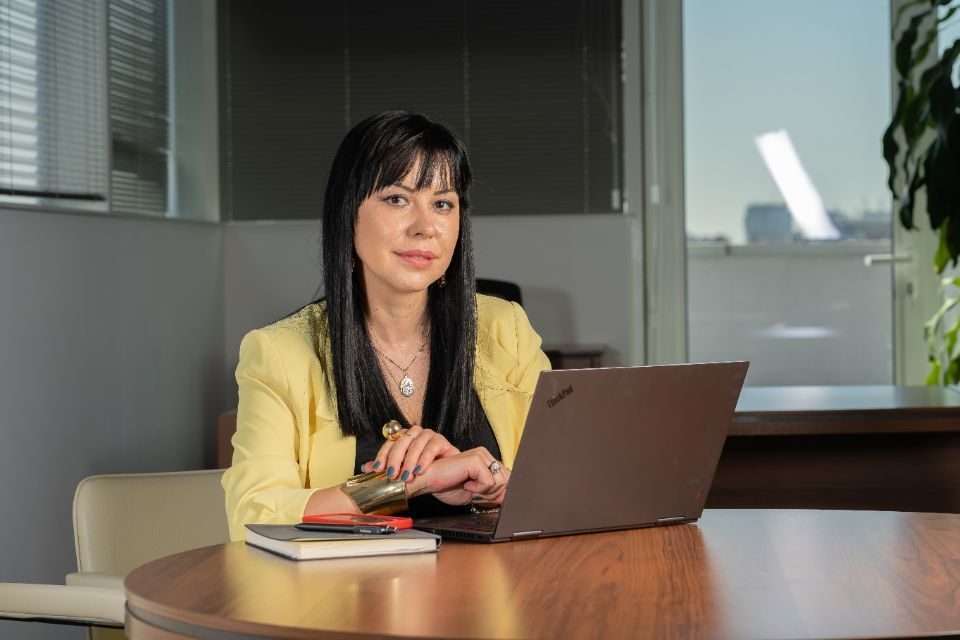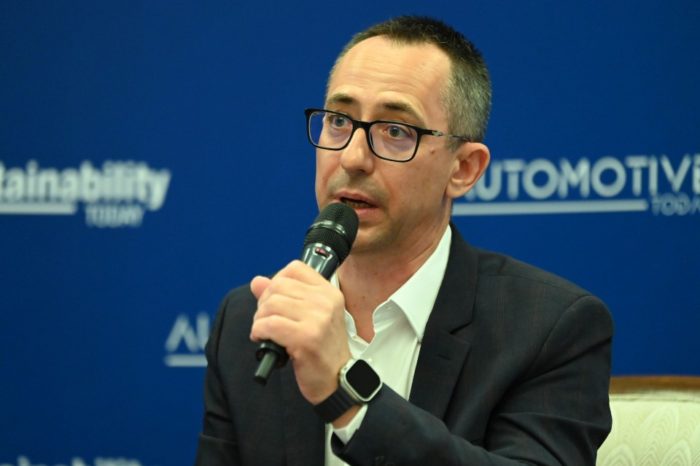Andreea Negru, ADAA: “We need to reset Romania’s education system”

“Entrepreneurs are businesspeople who have the courage and determination to overcome any challenge and obstacle that stands in the way of achieving their dreams. This aspect was even more visible during the pandemic period which led to the adaptability of the business environment, in general, to the conditions of social distancing, rethinking the business in some cases, reinventing some businesses, or starting new ones meant to meet market requirements in the current context,” Andreea Negru, president of the Association for the Development of Local Entrepreneurship (ADAA) told The Diplomat-Bucharest.
“In order to adapt the Romanian education system to the needs of the labour market, it is necessary to reset education in Romania, starting from the rewriting of the school curriculum and relying on the introduction of vocational counselling and vocational education classes in schools. We cannot decouple labour market education because we operate in an integrated system, generating sustainable economic growth.”
What are the objectives of the Association for the Development of Local Entrepreneurship (ADAA)?
The Association for the Development of Local Entrepreneurship was created to promote the role and importance of entrepreneurship for a sustainable development of the economy at national level. We support entrepreneurs who seek to generate evolution and an innovative approach to the local business culture. In the current macroeconomic context, it is necessary for the voice of entrepreneurship to be heard so that decision-makers act in accordance with the ideas and solutions proposed by the business environment.
In this spirit, ADAA organizes key events for the entrepreneurial environment and actively participates, together with decision makers through a public-private partnership, in identifying solutions necessary for efficient development and with a direct impact on the business community at national and international level. Consulting the entrepreneurial environment is essential for the construction of legislation that responds to the challenges and needs of the Romanian business environment.
We stimulate private initiative and work together with decision makers to create predictable legislation in different areas of activity to achieve beneficial results in the economy. Our main objective is to attract a growing number of prestigious representatives of the Romanian business community, eager to support the projects we implement.
What are the most important ongoing ADAA projects and what projects are you preparing for 2022?
The Association for the Development of Local Entrepreneurship developed together with the National Confederation for Women Entrepreneurship (CONAF) the project “Labour Pact”, a national project, lasting two years, which took place in the most important economic centres in the country and aimed at identifying solutions for the flexibility of the Romanian labour market. Also, in the same formula, we conceived and implemented the project “Pact for Entrepreneurial Education”, through which we campaigned for the introduction of entrepreneurship classes in schools, starting with primary classes.
Together with the National Association of Entrepreneurs ANAA, we were partners in the project “Romanian Tourism: Between impasse and opportunity”, a national project that sought solutions to place tourism as a priority axis of sustainable economic development. As we go through a period of challenges, “Building a Post-Pandemic World: The path to a more sustainable resilient and safe society” is another institutional partnership concluded with the MediaUno Press Group which identifies ways to follow the post-pandemic in all spheres of the economy. The project comes as a continuation of last year’s “Together we protect Romania”, in which ADAA was a partner and I was a speaker in the panel on education. I believe that a strong society must be based on a thorough education, which is why, together with our partners, we are developing the project “Educate for life” which will continue next year. We are aware of the importance of the association in projects of national interest, reason for which I thank in this way all the partners who know that only together, by joining forces we can bring substantial improvements in the Romanian society.
What are the challenges a Romanian entrepreneur is currently facing?
Entrepreneurs are businesspeople who have the courage and determination to overcome any challenge and obstacle that stands in the way of achieving their dreams. This aspect was even more visible during the pandemic period which led to the adaptability of the business environment, in general, to the conditions of social distancing, rethinking the business in some cases, reinventing some businesses, or starting new ones meant to meet market requirements in the current context. In today’s highly ultra-competitive business environment, entrepreneurs face more challenges. They must find solutions to the already classic challenges they face in the Romanian economy: the unpredictability of fiscal measures and public policies, access to finance, political instability that affects the economic environment. As a result, entrepreneurs try as much as possible to function independently of the political context, following their business interest and focusing their own forces on the path to success. The impact felt in certain sectors of activity was obvious and many entrepreneurs chose to restrict their activity, some even could not cope and closed the gates. Most of them, however, have diversified, continuously adapting to a moving market and to measures taken by the authorities overnight depending on the evolution of the health crisis.
The health crisis caused by COVID-19, beyond the situation of extreme difficulty faced by companies and continues to be faced by companies in many economic sectors, is about to produce major changes and at a fast pace globally, with important implications for the Romanian economy and local entrepreneurship in the next period. On the one hand, we are talking about the extremely rapid acceleration of the digitalisation of the economy, on the other hand, we are talking about massive injections of liquidity in the context of the European recovery plan, with additional focus on environmental sustainability.
To successfully overcome this period, not only the agility and vision of local entrepreneurship will be tested, but also organizational capacity, innovation, and access to high technological and strategic knowledge.
What are the ways in which we can adapt the Romanian educational system to the needs of the labour market?
In order to adapt the Romanian educational system to the needs of the labour market, it is necessary to reset education in Romania, starting from the rewriting of the school curriculum and relying on the introduction of vocational counselling and vocational education classes in schools. We cannot decouple labour market education because we operate in an integrated system, generating sustainable economic growth.
We are talking more about sustainability, resilience, and safety, but all this can materialize if we are based on an adequate educational system. From the moment the children finish high school, everyone should know which way to go. High schools should prepare young people for a career. We need nurses, firefighters, locksmiths, plumbers, and the list can go on with all the trades for which secondary education is enough. But for these, we need vocational schools. With real practice, in the job you are preparing for in real life. An exemplary public-private collaboration is needed here.
Therefore, children who want to do a job, whatever the reasons for their choice, should be encouraged to do so. As a result, the certification of skills acquired in vocational education must be the basis for employing young people in the professions studied. On the other hand, let’s not forget to prepare students for tomorrow’s jobs today! Let’s not be stuck in the present, without having a constructive vision of the future. Today, young people are prepared for professions that will no longer exist in 10 years. As a result, we must be visionary, know the evolutions of the post-pandemic world, with all the technology and innovation developed during this period to be able to prepare young people to be digital assistants, managers in smart home projects or specialists in visual identity protection, and examples can go on.
What should be the priorities of Romanian authorities regarding education?
People without education have no perspective. I think that the main priority of the authorities must be education. Why do I say that? Because there is a close interdependence between education and the labour market that is reflected in productivity and competitiveness at national and, obviously, international level. Economic logic is simple: the right person in the right place! If everyone, depending on their skills, vocation knows what their place is in the economy, then things start to move, and the results are not expected.
I rely on education as a pillar of sustainable development of a state, and the correlation between education and what the labour market demands today, coupled with a vision for the future involving digitalization, innovation and technology can have a major impact on state development.
How can the private environment contribute to the improvement of the educational process in Romania?
The private environment already contributes through the example it gives to society. I am referring to private schools whose approach is completely different from the state ones: children are urged to find their vocation, to identify their skills and to develop them so that, after finishing a school, they will be able to work in the field. chosen. Also, non-profit organizations are involved by developing and promoting examples of good practice, projects that target education in all its aspects and forms. The most important thing is to understand the imminent connection between what we form today and what we will have as economic development and the labour market in the future. Let’s not forget that we are responsible today for the education of young people and their guidance to the profession of tomorrow.















